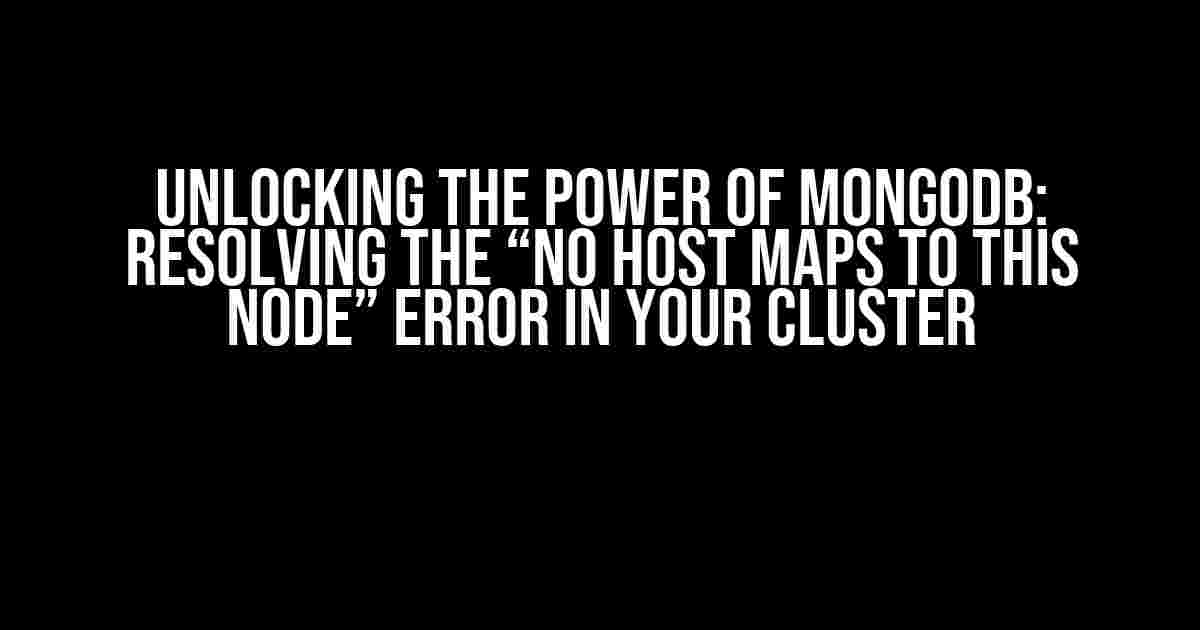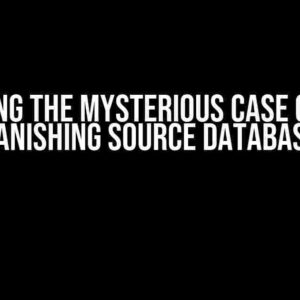Are you struggling to get your MongoDB cluster up and running smoothly? Are you plagued by the frustrating “No Host Maps to this Node” error? Fear not, dear developer, for we’ve got you covered! In this comprehensive guide, we’ll dive deep into the world of MongoDB clustering, explore the root causes of this error, and provide you with crystal-clear instructions to get your cluster firing on all cylinders.
What is MongoDB Clustering?
MongoDB clustering is a method of distributing data across multiple machines to improve performance, scalability, and high availability. By dividing your data into smaller chunks, called shards, and distributing them across multiple nodes, you can ensure that your MongoDB deployment can handle massive amounts of traffic and data.
The Benefits of MongoDB Clustering
- Improved Performance**: By distributing data across multiple nodes, MongoDB clustering can significantly improve query performance.
- Enhanced Scalability**: Clustering allows you to add or remove nodes as needed, making it easy to scale your MongoDB deployment to meet changing demands.
- High Availability**: With multiple nodes, MongoDB clustering ensures that your data remains accessible even if one node goes down.
The “No Host Maps to this Node” Error: What’s Going On?
When you encounter the “No Host Maps to this Node” error, it means that MongoDB is unable to map the hostname of one of your nodes to a physical IP address. This can occur due to a variety of reasons, including:
- Incorrect Hostname or IP Address**: Misconfigured hostnames or IP addresses can prevent MongoDB from resolving the node’s location.
- Firewall or Network Issues**: Firewalls, DNS resolution problems, or network connectivity issues can obstruct MongoDB’s ability to communicate with the node.
- Node Configuration Errors**: Incorrect configuration of the node itself, such as mismatched MongoDB versions or incompatible settings, can lead to the error.
Resolving the “No Host Maps to this Node” Error: Step-by-Step Guide
Now that we’ve covered the what and why, let’s dive into the fix! Follow these steps to resolve the “No Host Maps to this Node” error and get your MongoDB cluster up and running:
Step 1: Verify Node Configuration
Double-check your node configuration to ensure that:
- The hostname and IP address are correct and resolvable.
- The MongoDB version is compatible across all nodes.
- All nodes are configured with the same replica set name and members.
Step 2: Check Firewall and Network Configurations
Verify that:
- Firewalls are configured to allow incoming and outgoing traffic on the necessary ports (default is 27017).
- DNS resolution is working correctly, and the node hostname can be resolved to an IP address.
- Network connectivity is stable, and nodes can communicate with each other.
Step 3: Update the Hostname or IP Address
If you’ve identified incorrect hostname or IP address configuration, update the node’s configuration to reflect the correct information. You can do this using the following command:
mongo --port 27017
use admin
db.runCommand( { setParameter: 1, clusterIPMapping: { "old-hostname": "new-hostname" } } )
Step 4: Verify Node Membership
Confirm that the node is a member of the replica set by running the following command:
mongo --port 27017 use admin rs.status()
This will display the node’s membership and replication status.
Step 5: Restart the MongoDB Service
After making any configuration changes, restart the MongoDB service to apply the updates:
sudo service mongod restart
Troubleshooting Tips and Tricks
Still stuck? Here are some additional troubleshooting tips to help you resolve the “No Host Maps to this Node” error:
- Use the ` rs.printSlaveReplicationInfo()` command**: This can help you identify replication issues and provide valuable insight into node status.
- Check the MongoDB log files**: Inspect the log files for error messages related to node communication and hostname resolution.
- Verify DNS resolution**: Use tools like `dig` or `nslookup` to verify that the node hostname can be resolved to an IP address.
Conclusion
Resolving the “No Host Maps to this Node” error in your MongoDB cluster requires a methodical approach to identifying and addressing the root causes. By following these step-by-step instructions and troubleshooting tips, you’ll be well on your way to a high-performing, scalable, and highly available MongoDB cluster.
Remember, a well-configured MongoDB cluster is just the beginning. With regular monitoring, maintenance, and optimization, you can unlock the full potential of your MongoDB deployment and take your applications to new heights!
| Common MongoDB Cluster Errors | Solutions |
|---|---|
| No Host Maps to this Node | Verify node configuration, check firewall and network settings, update hostname or IP address, and restart MongoDB service. |
| Replication Lag | Check replication status, adjust replication settings, and optimize write performance. |
| Node Not Reachable | Verify node connectivity, check firewall settings, and ensure DNS resolution. |
We hope this comprehensive guide has helped you tackle the “No Host Maps to this Node” error and set you on the path to MongoDB clustering mastery! If you have any further questions or concerns, feel free to ask in the comments below.
Happy clustering!
Frequently Asked Question
This cluster conundrum got you stumped? Fear not, friend! We’ve got the lowdown on that pesky “No Host Maps to this Node” error in MongoDB Cluster.
Q: What causes the “No Host Maps to this Node” error in MongoDB Cluster?
This error usually occurs when there’s a mismatch between the hostname or IP address of your MongoDB node and the one specified in the cluster configuration. It can also happen if the node is not reachable or if there’s a DNS resolution issue.
Q: How do I troubleshoot the “No Host Maps to this Node” error?
Start by checking your MongoDB node’s hostname and IP address. Ensure they match the ones specified in the cluster configuration. You can use the `hostname -f` command to get the fully qualified domain name (FQDN) of your node. Also, verify that the node is reachable and there are no DNS resolution issues.
Q: Can I use a different hostname or IP address for my MongoDB node?
Yes, you can use a different hostname or IP address for your MongoDB node, but make sure to update the cluster configuration accordingly. You’ll need to update the `host` field in the `mongo.conf` file or the equivalent configuration file for your MongoDB deployment.
Q: What are the consequences of not resolving the “No Host Maps to this Node” error?
If left unresolved, this error can lead to issues with data replication, node availability, and overall cluster stability. It can also cause problems with MongoDB’s built-in monitoring and automation features, like the Automation Agent.
Q: Can I prevent the “No Host Maps to this Node” error from occurring in the first place?
Yes, you can prevent this error by ensuring that your MongoDB node’s hostname and IP address are correctly configured and match the ones specified in the cluster configuration. Regularly verify your cluster configuration and node settings to prevent any mismatches or issues.


